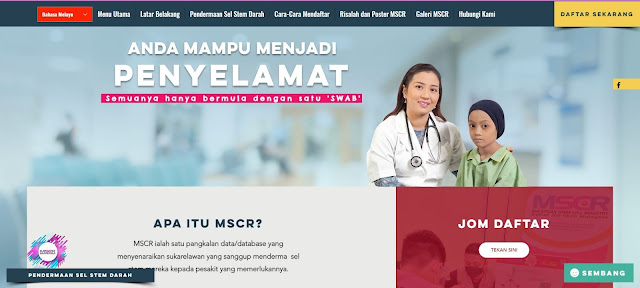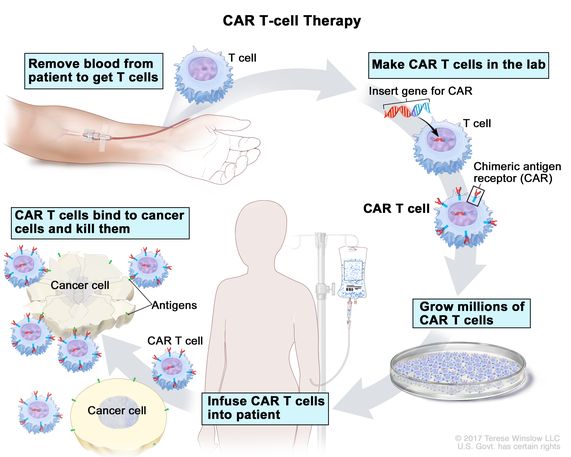Malaysia Stem Cell Registry (MSCR)
Stem cells, specifically adult stem cells, are unique cells present in the body of an adult human which have two defining characteristics – pluripotency and self-regeneration. Pluripotency is the ability to differentiate into nearly all types of cells which are present in the human body, whereas self-regeneration is the ability of the cells to divide and produce more cells identical to the parent cell (in this case, the stem cell). These two special characteristics of stem cells have subjected them to intense medical research over the past 20 years and have found their way into clinical applications in the form of stem cell-based therapy. In stem cell-based therapy, stem cells donated from a compatible donor are obtained and utilised to assist in the management of the ailment of the recipient. To facilitate the search for a compatible stem cell donor, a stem cell registry containing the directory of all registered stem cell donors is set up. In Malaysia, we have our own national stem cell registry which is called the Malaysian Stem Cell Registry (MSCR).

The MSCR was established in 2000 and it is a joint project by the Ministry of Health, the National Cancer Council (MAKNA) and the Institute of Medical Research (IMR). Its main objective is to identify, collect data from volunteers and perform a search for potential donors for those who are in need. It is targeting to achieve a total of 40000 registered stem cell donors but currently there are only approximately 18000 registered donors. The stem cells obtained from the donors are mainly used in Malaysia to treat patients suffering from leukemia or thalassemia. Initially, the close relatives of the patients are screened to determine compatibility with the patient. However, even among close genetic relatives, a compatible stem cell donor may not be found. The doctors will have to resort to finding a compatible donor for their patients through the MSCR. The success of finding a compatible stem cell donor is highly dependent upon the size of the registry and the ethnic diversity of the registrants. In other words, the larger and more ethnically diverse is the stem cell registry, the greater the success of finding a compatible stem cell donor. The compatibility of a donor with the recipient is based on matching the six HLA (Human Leukocyte Antigens) present on the white blood of cells of both the donor and the recipient to each other. If there is a match then the donor is considered compatible to the recipient.
The MSCR is a timely effort to draw from the benefits of modern stem cell research to assist those suffering from diseases treatable through stem cell-based therapy. Even though stem cell-based therapy in Malaysia is mainly confined to treating leukemia and thalassemia, the possibility of it to treat other common illnesses such as diabetes and cardiovascular diseases is strongly supported by current medical research. Even so, before stem cell-based therapy in Malaysia becomes routine clinical practice to treat common illnesses, it is imperative for the Malaysian public to be aware that there is a dire need to recruit more potential stem cell donors and register them into MSCR. The more people that are registered as potential stem cell donors, the greater the success of a patient finding a suitable donor. In addition, it will also make stem cell-based therapy more feasible for everyone in the event they succumb to leukemia or thalassemia and, in the near future, possibly diabetes or cardiovascular diseases.

The MSCR was established in 2000 and it is a joint project by the Ministry of Health, the National Cancer Council (MAKNA) and the Institute of Medical Research (IMR). Its main objective is to identify, collect data from volunteers and perform a search for potential donors for those who are in need. It is targeting to achieve a total of 40000 registered stem cell donors but currently there are only approximately 18000 registered donors. The stem cells obtained from the donors are mainly used in Malaysia to treat patients suffering from leukemia or thalassemia. Initially, the close relatives of the patients are screened to determine compatibility with the patient. However, even among close genetic relatives, a compatible stem cell donor may not be found. The doctors will have to resort to finding a compatible donor for their patients through the MSCR. The success of finding a compatible stem cell donor is highly dependent upon the size of the registry and the ethnic diversity of the registrants. In other words, the larger and more ethnically diverse is the stem cell registry, the greater the success of finding a compatible stem cell donor. The compatibility of a donor with the recipient is based on matching the six HLA (Human Leukocyte Antigens) present on the white blood of cells of both the donor and the recipient to each other. If there is a match then the donor is considered compatible to the recipient.
The MSCR is a timely effort to draw from the benefits of modern stem cell research to assist those suffering from diseases treatable through stem cell-based therapy. Even though stem cell-based therapy in Malaysia is mainly confined to treating leukemia and thalassemia, the possibility of it to treat other common illnesses such as diabetes and cardiovascular diseases is strongly supported by current medical research. Even so, before stem cell-based therapy in Malaysia becomes routine clinical practice to treat common illnesses, it is imperative for the Malaysian public to be aware that there is a dire need to recruit more potential stem cell donors and register them into MSCR. The more people that are registered as potential stem cell donors, the greater the success of a patient finding a suitable donor. In addition, it will also make stem cell-based therapy more feasible for everyone in the event they succumb to leukemia or thalassemia and, in the near future, possibly diabetes or cardiovascular diseases.
REFERENCES
1. What are stem cells?
http://www.csa.com/discoveryguides/stemcell/overview.php
2. Malaysian Stem Cell Registry
http://www.imr.gov.my/highlights-featured-articles/1112-malaysian-stem-cell-registry-mscr.html



Comments
Post a Comment